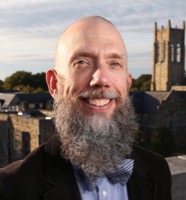David Rupke: Candidate for Nominating Committee

Affiliation: Rhodes College
Position/Title: Associate Professor of Physics
PhD institution: University of Rome`La Sapienza’, Italy (1992)
Areas of scientific interest:
- Galactic winds
- Galaxy evolution
- Active galactic nuclei
- Astronomy education
AAS and/or Division leadership positions and dates:
n/a
Other relevant positions, experience, and dates:
- Postdoctoral fellowship program reviewer, NASA (2017 – 2018)
- Member, Time Allocation Committee, Subaru Telescope (2016 – 2018)
- Review panel member, National Science Foundation (2012)
- Member, User’s Committee, Anglo-Australian Observatory (2011 – 2014)
Statement:
The role of the nominating committee might be likened to the force of gravity in the Solar System; it shepherds the planets and other bodies into the right orbits so they can take the starring roles in the action. The strength of our society is in its human capital, and a healthy community will know how to match the strengths of individuals with the proper roles. Each person in the society represents a unique web of relationships and set of perspectives. My network involves research collaborations stretching back almost two decades and some merely a year old; connections with researchers at a wide variety of US and international institutions; fellow astronomy teachers at community colleges, liberal arts schools, and universities; scientists at a wide variety of observatories; and plenty of AAS members who I've had the pleasure to meet at conferences, workshops, and observing runs. My perspectives are rooted in a diverse set of professional experiences ranging from conversations with Nobel Prize winners to advising undergraduates who are coding their first plot in Python. If elected to be a member of the nominating committee, I will bring these relationships and perspectives to bear as a team member with the rest of the committee. We will bring to the society a slate of nominees that reflect the breadth and depth of the society in as full a way as possible, as well as choosing candidates who will bring humanity and effectiveness to their roles in advancing the goals of the society: professional development, good science, good teaching, science advocacy and literacy, and a diverse and inclusive community.

